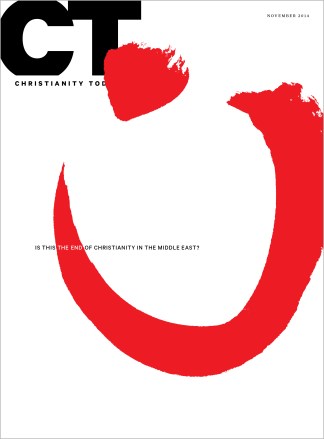If Psalm 139 were published as a contemporary book, it might look a lot like Rob Moll’s What Your Body Knows About God: How We Are Designed to Connect, Serve and Thrive (InterVarsity Press). Channeling the psalmist’s wonder at having been “woven together in the depths of the earth,” Moll, a CT editor at large, wonders at the marvel of humanity: its dynamic blend of body, mind, soul, and spirit. Christians don’t worship God, serve their neighbors, and connect with other people merely because of external rules; such impulses are inscribed in our DNA.
What Your Body Knows About God: How We Are Designed to Connect, Serve and Thrive
IVP
217 pages
$11.82
“Spirit and flesh, it turns out, are intimately intertwined,” writes Moll. “And understanding how things work—how our bodies are designed to commune with God—can enhance our faith and give us a fuller picture of God’s work in the world and in our lives.”
It’s not easy to live as embodied creatures today (to say nothing of previous eras). All too often, human bodies are treated (by others, and even ourselves) as commodities or instruments of sexual satisfaction. They are bought and sold, mutilated by others, and hit with self-inflicted harms. Yet Moll reminds us how high a privilege it is to dwell in flesh. “Our bodies, the Bible says, are the temples of God—the place where God lives.”
Embracing the Body
Over hundreds of years and across various cultures, Christians have carried on a rich conversation about the body: its nature, its value, and its purpose. Moll strikes an excellent balance between invoking the best of that tradition and making it fresh for today’s readers. What Your Body Knows About God draws from Christian history, cutting-edge research in neuroscience and biology, and anecdotes from Moll’s own life.
The book is divided into three parts. Part one, “Spiritual Bodies,” explains how certain activities move our spirits, from everyday routines like eating and exercise to more profoundly formative habits of friendship and intimacy. The spiritual life can seem like an endless, futile attempt to overcome the very fact that we have bodies. But Moll is deeply reassuring. He encourages us to recognize, celebrate, and strengthen the body–soul connections that are part of God’s good design.
Of course, our bodies aren’t immune to malfunction. Nor are they effortlessly connected, at all times, to God and others. Readers will be grateful to Clarissa, Moll’s wife, for allowing him to share stories of the panic attacks she experienced after giving birth to their fourth child. Her illness affected the entire family, and the road to recovery was long. Moll asks the difficult questions familiar to anyone who’s endured brokenness: “How could I stand in awe of God’s glorious design for our bodies when things could go so badly wrong?” Researching and writing during Clarissa’s crisis, he worried that pressing on with the book would prove a fool’s errand.
Moll doesn’t offer answers or solutions to the problem of bodily suffering. Instead, he shares a realization: When “suffering turns to compassion,” the “questions provoked by suffering can find resolution.” Pain breaks us open, allowing us to become kinder and more generous toward others who suffer and preparing us to recognize God’s suffering in the person of Christ. These spiritual moves can renew and strengthen one’s relationship with God. Moll also dwells on biblical accounts of Paul’s physical afflictions to arrive at fresh insights on the spiritual avenues opened by pain.
If the book’s first part focuses on how God has made our bodies, part two, “Spiritual Growth,” explores what we do with what we’re given. We can choose to discipline our lives, both body and spirit, with worship, prayer, and service. These practices put our bodies and souls on the same page, supplying “the routines necessary to train our bodies, and thus our minds as well, to follow after Jesus.”
Experiencing God through worship, prayer, service, and close relationships strengthens a “spiritual circuit” in the brain that primes us for experiencing the sacred. Moll sees this in Saul meeting the Lord on the road to Damascus; this divine encounter produced transformation and prepared him for future ministry. Certainly, not all spiritual experiences are dramatic. But even quiet or serene encounters with the sacred can, with enough repetition, jump-start the brain’s spiritual circuitry. Intense experiences, in particular, “loosen up” neural pathways that open us to transformation. Religious disciplines, then, enhance social awareness and empathy while tamping down destructive feelings and emotions.
Drawing on the work of cognitive psychologist Jonathan Haidt, Moll questions whether the way we behave and believe arises from conscious thought and rational decision-making. Instincts and emotions, he argues, drive many of our judgments and actions, even explicitly moral judgments and actions. Moll counsels us to embrace the paradox that we both do and do not direct our own spiritual course.
Part three, “The Difference It Makes,” looks at how recharged spiritual circuits change us for the better. “Through prayer, worship, and study,” Moll writes, “as God rewires our brains and renews our minds, he makes us into new creatures.” We already know that discipleship is transformative, but Moll explains some of the hows and whys, based on current scientific consensus. Readers may willingly agree with this general idea, even as they pause to chew on some of Moll’s more challenging topics, such as the doubtful relationship between intercessory prayer and health. He argues that praying, in and of itself, has a positive effect on health, but specific prayers are not scientifically linked to specific outcomes.
Whole Discipleship
In societies influenced by the artificial mind–body divide, spiritual pursuits might enliven the heart while seeming to leave the body untouched. The best the body can do, from this perspective, is to avoid sin. Its only job is to not interfere with the soul’s progression toward heaven. What Your Body Knows About God is just the right antidote to this platonic way of thinking.
“As we connect with God and invite others to join this life of prayer, worship, community, and service,” writes Moll, “we align our biological and spiritual selves with the Creator of the universe and the most fundamental guide for life—loving God and loving others.”
Moll offers realistic and inspiring examples of what it looks like to walk this path, crookedness and all. Anyone who has struggled to pay attention in prayer can resonate with his account of sitting against the wall in his children’s bedroom after they are tucked in bed, praying in the quiet darkness, sometimes finding focus, other times wandering.
The psalmist rejoices “because I am fearfully and wonderfully made; your works are wonderful” (139:14). With smart, tender, and authentic prose, What Your Body Knows About God beautifully sings this in a 21st-century key.
Jenell Williams Paris is professor of anthropology at Messiah College and the author of The End of Sexual Identity: Why Sex Is Too Important to Define Who We Are (InterVarsity Press).











